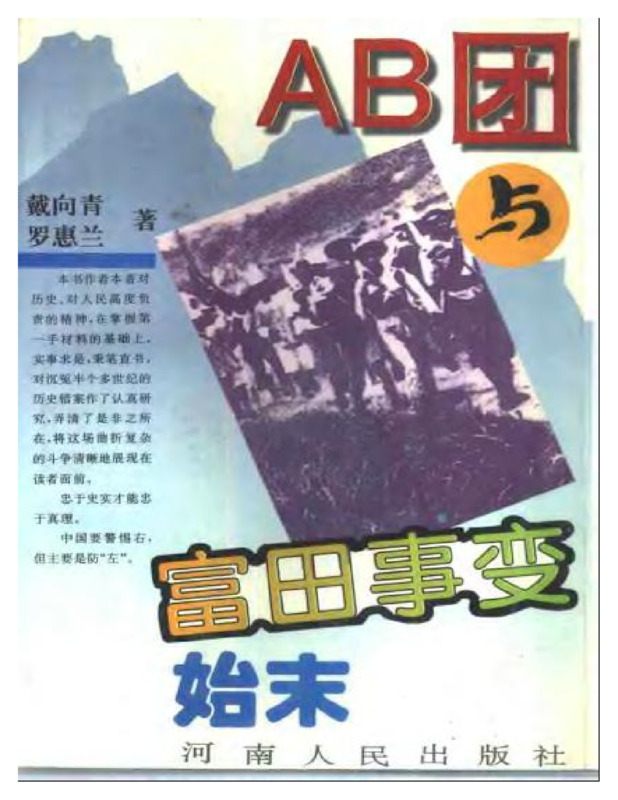Explore the collection
Showing 6 items in the collection
6 items
Book
1966: Memories of Our Generation
This book is a collection of nineteen feature articles by well-known contemporary scholars, researchers, and writers. They recapitulate their own experiences during the Cultural Revolution in a literary style.
When the Cultural Revolution broke out, they were all young people in their twenties. These reminiscence articles are the result of a rare collective reflection after the end of the Cultural Revolution. The authors described their own experiences during the Cultural Revolution in the articles, providing a personal perspective on history.
The chief editor of this book is the philosopher and activist Xu Youyu, a former researcher at the Institute of Philosophy, Chinese Academy of Social Sciences. Xu signed and made suggestions on Charter 08, and also is a co-founder of the New Citizens Movement. Since 2015 he has resided in New York City, where he has been a visiting scholar at the New School for Social Research.
This book was published by China Federation of Literary and Art Circles Publishing Corporation in 1998.
Book
AB Corps and the Futian Incident
In 1930, a mutiny erupted in the Red Army in the town of Futian. In the ensuring purge, more than 700 officers were executed. After this, the campaign to root out Anti-Bolshevik (AB) groups spread to various parts of China, with 70,000 executed. Occurring just nine years after the founding of the CCP, it is one of the earliest and most significant purges in the party's early history.
The first person to pay attention to the Futian Incident was Professor Dai Xiangqing of the Jiangxi Provincial Party School. Starting in late 1979, he and other colleagues went to southern Jiangxi to collect materials, conduct interviews and investigate, and found that this was an unjust and wrong case, and began to publish articles on the matter.
In the early 1980s, Dai Xiangqing sent his article to a senior general in the PLA, Xiao Ke. After that, the research on the Futian Incident attracted the attention of senior central officials. The CCP's party history research agency sent people to Hunan and Jiangxi to investigate and collect materials. The Organization Department of the Central Committee of the Communist Party of China sent a review team for the Futian Incident and reported the vindication documents to the central government, but even today there is currently no official conclusion on the matter.
This book is an important study of the early history of the Communist Party of China, often mentioned by prominent independent historians, such as Yang Kuisong. As an officially recognized research project, this book does not make ideological breakthroughs, but its detailed historical materials, and its data index make it particularly valuable for understanding this historical event.
This book was published by Henan People's Publishing House in 1994.
Book
Earthquake Insane Asylum
On May 12, 2008, when the Great Sichuan Earthquake struck, writer Liao Yiwu began to write "Chronicle of the Great Earthquake", which was serialized in <i>Democratic China</i> and reprinted on several Chinese websites. It had a wide impact. Liao went to Dujiangyan, Juyuan Township, Yingxiu and other earthquake-hit areas to conduct on-the-spot interviews. His travels and writings during the earthquake were reported and translated by many mainstream media.
In April 2009, Taiwan's Asian Culture Publishing published and distributed the traditional Chinese edition of <i>Earthquake Insane Asylum</i>, a pictorial and textual factual record that preserves the living conditions of the people during of the Sichuan earthquake.
Book
Rebellion in All Its Shapes and Colors --The Formation and Evolution of the Spiritual Qualities of the Red Guards
This book seeks to reveal the characteristics of the Red Guard movement through the study of the Red Guard's spiritual qualities, such as the mode of action of the rebellion, the formation of factions and regional differences, as well as the types of Red Guard ideology and the trend of change before and after the Cultural Revolution, etc. The author is a peer of the Red Guard and has accumulated first-hand information on the subject through extensive interviews and documentary research. The author of this book, Xu Youyu, is a peer of the Red Guards, and has accumulated first-hand information about the research through a large number of interviews and documentary research. At present, there are very few studies that analyze the formation of the Red Guards' mentality based on oral data and case studies. Therefore, this book is of great reference value to researchers in this field. This book was published by the Chinese University of Hong Kong Press in 1999.
Book
The Last Landowner (Record of Chinese Grievances Volume 3 - Book 1)
Land reform is one of the important events that affected the course of Chinese history in the twentieth century. Liao Yiwu spent two years on and off from the end of 2005 to complete <i>The Last Landlord</i>. The book comprises interviews with land reform survivors. As the author says, "Based on the degree of physical and mental weakening of the interviewees, I estimate that in another five or six years, the history of the land reform as orally told by those who witnessed it will be completely untraceable."
Film and Video
Working toward a Civil Society (Episode 8): Xu Youyu
How can China build a true civil society? Since 2010, independent director Tiger Temple has conducted a series of interviews with scholars and civil society participants.





